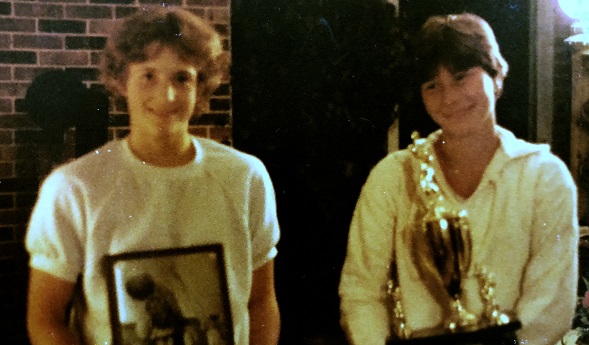
1st Miss Basketball Recalls Marvelous Rise
January 31, 2018
By Ron Pesch
Special for Second Half
In the eyes of Julie Swanson, she lived an idyllic childhood.
She grew up in Leland. Her family lived on a small lake, a mere half mile from Lake Michigan. “I was a tomboy,” said Swanson recently from her home in Charlottesville, Va.
Today, the mother of three, Swanson excitedly reminisced about those early days when she was known as Julie Polakowski. As a kid, she saw herself without borders. She could become an artist, or a writer, or a woodworker. As time passed and her interests grew, she thought she might become an engineer or a teacher.
Then basketball arrived in her life, and life changed. She added coach to the list of possibilities.
“Our school was little, and we had a really small class,” remembered Swanson. “In seventh grade, school sports were offered for the first time; basketball for the boys, and cheerleading for the girls. I was shy and unassertive and didn't want to have to make waves to be allowed to play on the boys' team, but being a cheerleader just wasn’t me. And luckily I didn't have to make waves.”
The 1977 Leland yearbook lists 15 students in Polakowski’s seventh grade class – seven boys and eight girls.
“Not all of the boys wanted to play basketball. But I wanted to be on the team,” she said. “So I went out with my classmate, Cindy Moore. I think everyone was aware of Title IX. I don’t recall really any resistance. Besides, they kind of needed us. What would happen if someone got sick, or couldn’t play? Everyone wanted sixth and seventh team members.
“You could see it was more of a weird thing for the other team,” she continued, describing the restlessness in the opponents’ huddle as the game was about to begin. “No one wanted to be the one who had to guard the girl. Sometimes they would be afraid of contact. Sometimes, they would play harder, because they were afraid that they might have a girl score on them. Either way, it made you a better player.”
Simultaneously, changes occurred at Leland that would alter the path of a number of girls from the little town in Leelanau County.
***
Larry Glass grew up in Beavercreek, Ohio, and graduated from the local high school in 1953. A four-sport star, he excelled in baseball and helped pitch the Beavers to the Class B state baseball championship as a junior and senior.
Glass earned a baseball scholarship to Miami of Ohio University, an hour from home. There he also played basketball, where he was a dependable sixth man. In 1956, he gave up a year of college eligibility to sign with the Cleveland Indians, and kicked around their minor league affiliates for a couple seasons before an arm injury ended his playing days.
 Following college and baseball, he taught a half year at Beavercreek, then taught English and coached a variety of sports for two years at Columbus Grove High School in Ohio.
Following college and baseball, he taught a half year at Beavercreek, then taught English and coached a variety of sports for two years at Columbus Grove High School in Ohio.
In 1957, his old college basketball coach, William Rohr, became head basketball coach at Northwestern University. In 1960, Glass was asked to join the staff at the Big Ten school, first as freshman basketball coach, then as a varsity assistant. When Rohr left to become athletic director at Ohio University, the 28-year-old Glass was named Northwestern’s new varsity coach. He remained at the helm for six campaigns. In 1967, Glass earned National Coach of the Year votes, departing from the college coaching ranks following the 1968-69 season.
“There are people who are motivated by an intolerance to losing,” Glass told the Chicago Tribune. “It`s not so much they have to win, it`s that they can`t stand to lose. I don`t say that with any pride. It`s the way I operate. I hate to lose. When I got my big break, I got it at a place where you kind of have to get used to it. I couldn’t, and couldn’t see any way out of it. Ultimately, it got to the point where I didn`t have fun going to practice. The game simply wasn’t any fun anymore.”
He moved his family to northern Michigan, purchased the former Stier Motel on the west shore of upper Lake Leelanau, renamed it the “Glass House Motel” and then returned to the classroom, teaching seventh grade English at Leland. Life again changed when he was asked by his youngest daughters, Laurie and Rebecca, to take over the girls basketball program in 1977.
Traverse City Record-Eagle sports editor Dennis Chase recalled the story in 2012: “When the girls coach, Nancy Boynton Fisher, became pregnant, Glass felt some serious pressure to take over.” Larry and Dee Glass had three daughters and a son. When Dee asked her husband what he would do if his son had made the request for him to coach the boys team, Larry Glass, still running the motel, conceded, and took control of the girls team.
“OK,” he told his bride, “but I want you to understand, if I'm going to try to do this thing right, I'm not going to be home a lot." Glass would hook Polakowski and a host of girls at Leland on the game.
“Credit (for what came next) goes to our amazing coach, Mr. Glass,” said Swanson, admiringly. “He was our inspiration. “
The feeling, you could say, was mutual.
 “I find in my experiences that when you explain something to girls they listen,” said Glass to Detroit Free Press sports writer Mick McCabe in 1981. “There were always a few boys who were like Ford – they had a better idea. I guess some day it may get like that for girls, too.”
“I find in my experiences that when you explain something to girls they listen,” said Glass to Detroit Free Press sports writer Mick McCabe in 1981. “There were always a few boys who were like Ford – they had a better idea. I guess some day it may get like that for girls, too.”
Girls basketball was played in the fall in Michigan at the time. Leland’s Comets went 13-6 in 1977 under Glass’ direction, then 18-3 in daughter Laurie’s senior year, falling in the District tournament to Maple City Glen Lake. The team finished with a 19-2 record the following year, also falling to Glen Lake in the postseason.
“They were our rival” recalled Swanson. “You know rivalries. You hate them. They’re the enemy.”
“In Polakowski’s first two years, Leland didn’t do much in the state tournament,” wrote McCabe, “mostly because of (Glen Lake’s) Laura Wiesen.” Another thorn was Kim Kaiser.
“We couldn't beat Glen Lake for three years,” Glass told Chase. “We finally beat them the fourth year when we started our run. We felt back then that the winner of the Leelanau District would be the state champion. We felt we were basically playing championship games at the District level. Glen Lake won one (state) title and should have won a second in that three-year span (1977-79).”
The Leland girls won the first of three consecutive MHSAA Class D titles in December of 1980 when Glass’ daughter Rebecca, his youngest, was a senior. It was Polakowski’s junior year.
In September of 1981, Coach Glass discussed the team’s success with McCabe, and explained why he returned to coach the girls after Rebecca had graduated.
“… I don’t feel I ought to leave the girls we have back for this team,” he said. “Julie averaged three hours a day practicing basketball this summer, and I like that kind of dedication.”
Leland's 1981 team posted a 28-0 record en route to the second consecutive MHSAA Class D title.
Polakowski finished her senior season with 812 points, a new single-season scoring mark, topping the 804 points scored by Evelyn Johnson of Lansing Everett in the fall of 1978. Polakowski’s career total of 2,109 points ranked second in Michigan history behind the 2,227 scored by Jackson’s Regina Pierce.
In late December, Polakowski and 19 others were named by the Detroit Free Press as first-team all-state selections. Glass, who would guide Leland to a third consecutive title in 1982, was honored as the state’s Coach of the Year. “Perhaps the best player in the state can be found among the Class D All Staters,” wrote McCabe alluding to the presence of both Polakowski and Wiesen on the honor team.
***
In the spring of 1981, the Michigan High School Basketball Coaches Association had presented Sam Vincent of Lansing Eastern with the first Hal Schram Mr. Basketball Award.
Similar honors were tradition in Indiana, California and other states. Now Michigan had one, to be presented to the state’s top senior male high school basketball player. Sponsored by the Detroit Free Press, the award was named after the highly-respected sports writer who had covered interscholastic athletics for the paper since 1945.
 In February 1982, two months after the announcement of the girls all-state teams, the Coaches Association announced the creation of a Miss Basketball Award to be presented to the state’s top senior female high school basketball player from the recently completed season.
In February 1982, two months after the announcement of the girls all-state teams, the Coaches Association announced the creation of a Miss Basketball Award to be presented to the state’s top senior female high school basketball player from the recently completed season.
Sponsored by the Lansing State Journal, it was styled after the Schram award. The winner of the honor would be announced in early April. Presentation of the award would come at the Coaches Association’s third annual All-Star Festival, hosted at Michigan State University’s Jenison Fieldhouse in late June.
Besides Polakowski, five other players from around the state were nominated for the honor. It was a talented bunch. Each would play in the first Girls East-West All-Star game, hosted by the Coaches Association.
• Lori Vettes of Addison, a 5-foot-7 guard named Class C first team all-state by the Free Press.
• Allison Geatches, an all-around sports star at Harper Woods Regina. A fourth team Parade All-American, she later played college ball at the University of Detroit before heading overseas to play a year of professional basketball in Belgium. Later, she spent a season with the Colorado Silver Bullets, an all-female baseball team that barnstormed the United States during the mid-1990s, squaring off against male counterparts. She went on to coach softball at Macomb Community College.
• Sal DeGraw, a four-year starter, three-time team Most Valuable Player and a Class B all-state selection at Marshall. DeGraw later starred as a softball player at Alma College. Marshall fell short of an MHSAA basketball title in DeGraw’s senior year, but in 2000, now as Sal Konkle, she took the reins of the girls basketball program at her old high school. In 2016, Konkle guided Marshall to an MHSAA championship game for the first time since 1981. This time, with her daughter on the team, Marshall emerged victorious.
• Denise Basford, a 5-foot-9 guard from Farmington Our Lady of Mercy, and honorary captain of the Free Press Class A all-state squad. She would go on to play at Notre Dame. A leader on the court, today she’s a lawyer and the mother of two college volleyball players.
• Kelly Belanger, a 5-foot-10 guard and forward at East Kentwood who earned Class A all-state honors. Following graduation, she would join Polakowski on the basketball court at Michigan State University. Today, she’s a professor of English at Valparaiso University and the author of Invisible Seasons – Title IX and the Fight for Equity in College Sports.
At least today, the absence of Wiesen from the ballot was surprising.
“Really?” said Swanson, 35 years later. “Laura was their best player. She was a better athlete than me. I thought she was great.
“Every year, Glen Lake’s boys coach Don Miller would host the Leelanau County basketball clinic,” remembered Swanson. “It had always been hosted at Glen Lake, but one year he had it come over to Leland, and then it alternated. Anyway, there we got to know each other, we got to befriend them. I got to know her, and I really liked her.”
“She was a very good player,” recalled Belanger. Wiesen went on to play at Northwestern, and then returned to Glen Lake, serving as assistant to her high school coach, Ted Swierad.
 In early April, Polakowski was named the winner of the first Miss Basketball honor, but, unlike today, no vote totals were announced.
In early April, Polakowski was named the winner of the first Miss Basketball honor, but, unlike today, no vote totals were announced.
“It was a nice surprise for me,” she recalled.
In June 1982, a team of all-stars separated into squads representing the East and West sides of the state. For the first time, the All-Star Festival included a game for the girls. Before the contest, Polakowski was honored with the Miss Basketball Award.
“My jersey number was 1,” remembered Swanson. “It was kind of embarrassing.”
The West, made up of primarily Class C and D players, won 81-62, with Polakowski and Wiesen sharing the backcourt. The girls also shared top scoring honors with 17 points each. Wiesen was awarded the MVP award for the game.
Marveling at the list of candidates and recalling the all-star game, former Grand Rapids West Catholic and Aquinas College girls basketball coach – and spokesperson for the Coaches Association at the time of the first award – Patti Tibaldi spoke glowingly about the era and the efforts to honor the girls.
“I’m nostalgic for the time. Wow. It was a time of all kinds of change – wonderful, challenging times,” Tibaldi said. “These girls (from the era) were so grateful for the chance to play, so passionate. They would have run through a wall for their coaches.”
“I think I learned I was nominated from my high school coach at Regina, Diane Laffey,” said Geatches, who now lives in Florida. “I remember the (all-star) game at the fieldhouse at MSU and being in awe. We were treated very well. My mom was there. I can’t tell you how I did in the game, but I recall being really happy about getting a new pair of tennis shoes for the game. I came from a family of seven, so that was kind of a big deal.”
“I guess I learned of the award, but I don’t recall when,” said Belanger, trying to remember the event. “I did play in the all-star game. I remember we stayed in the dorms at MSU. It was a different time. Girls basketball wasn’t as celebrated as it is today, but it was fun. I remember wishing there was more. At least, I wanted more. I don’t think there was as much year-around play. There were some camps for those who could afford them.”
“The girls today have no idea what these women went through,” added Tibaldi. “And that’s a good thing. They shouldn’t have to think about being given the same opportunities. Do you know what I mean?”
Swanson graduated from MSU, then taught math and coached girls varsity basketball in Iowa. These were the days when high school teams in Iowa began the switch from 6-on-6 basketball, once the norm across the nation for girls, to the five-player game. Following her marriage to husband Steve, who has served as head coach of the University of Virginia women’s soccer team for the past 17 years, and the birth of their first child, Swanson became a stay-at-home mom and pursued life as a writer.
Today she is the author of middle grade and young adult novels, including Going for the Record.
“I might not have been the most athletic,” added Swanson, “or the best player in the state. But basketball was everything to me.
“I doubt anyone could have been more obsessed with, maybe even unbalanced by, the game than I was.”
PHOTOS: (Top) Julie Polakowski (left with Miss Basketball plaque) and Laura Wiesen (right with her MVP trophy) following the Coaches Association All-Star game. (Top middle) Larry Glass, who coached the Northwestern University men’s basketball team and later the Leland girls basketball team. (Middle) The Glass House Motel, purchased and renamed by the Glass family after its move to northern Michigan. (Bottom middle) Leland’s 1981 team finished 28-0 in winning a second straight Class D title. (Below) Polakowski, with the Miss Basketball trophy. (Photos provided by Ron Pesch.)
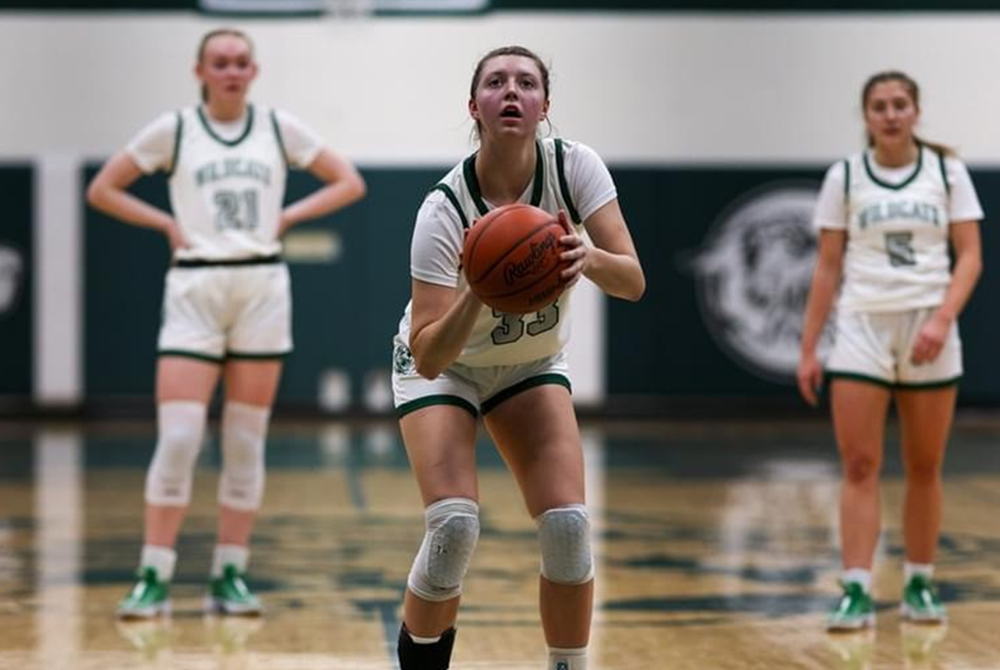
Laker Following Mother's Path as Wayland Multi-Sport Standout
By
Steve Vedder
Special for MHSAA.com
March 5, 2024
When Wayland junior Harmony Laker opted to embrace athletics many years ago, she never worried about following some pretty impressive footsteps nor matching the hefty accomplishments of someone very close to her, a mentor who had herself been a standout three-sport athlete in high school.
In fact, Laker has wound up starring in the same three sports in which her mother, 2000 Wayland grad Kara Potter, also excelled in high school – basketball, volleyball and softball.
Kara was all-conference in all three sports and earned all-state recognition in volleyball and basketball. Harmony has been all-league since her freshman season in the same three, and all-region in volleyball and basketball.
Just a chip off the old block? Maybe, says Harmony.
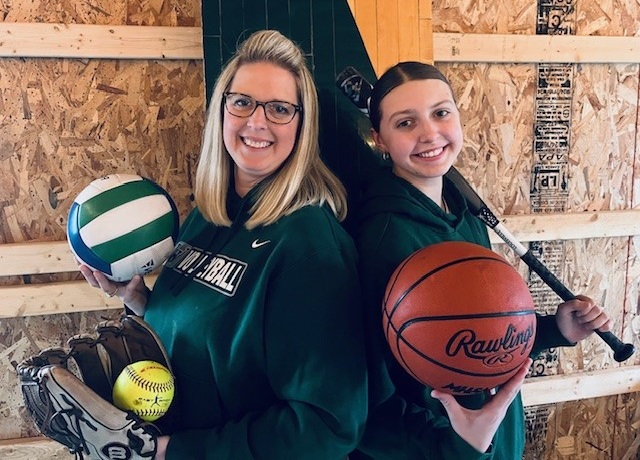 But if there is anything mother and daughter have in common it's a love of sports.
But if there is anything mother and daughter have in common it's a love of sports.
"They introduced me to sports, and I've always strived to be like my parents," Harmony Laker said. "I was always drawn toward basketball, volleyball and softball. That's where my heart has always been, on a court or a field.
"I always wanted to play three sports; that's been my goal since middle school. Like my mother, I've always taken them seriously."
Like her mother, Laker hasn't just lettered in three sports – she's been outstanding. As a junior, she's already shattered the 1,000-point career basketball mark, reaching the milestone when she scored 38 points against Grand Rapids South Christian in late January. She's averaging 19 points, seven rebounds, four steals and three assists per game.
In volleyball, Laker had 864 kills, 513 digs, 80 blocks and 64 aces while serving 90 percent this season.
In softball, Laker has a 29-4 record as a pitcher over her first two seasons while batting .449 with six doubles and three homers as a sophomore. She's twice made all-conference in that sport, leading Wayland to two conference titles.
Kara Laker – also Wayland’s volleyball coach – said she and Harmony's father, Lance, a former varsity basketball coach at Middleville Thornapple Kellogg, never tried to edge their daughter toward athletics.
But when Harmony took up a variety of sports, the parents had one standing rule: Commit to the sport you're playing at the time. Worry about the other sports when it's time.
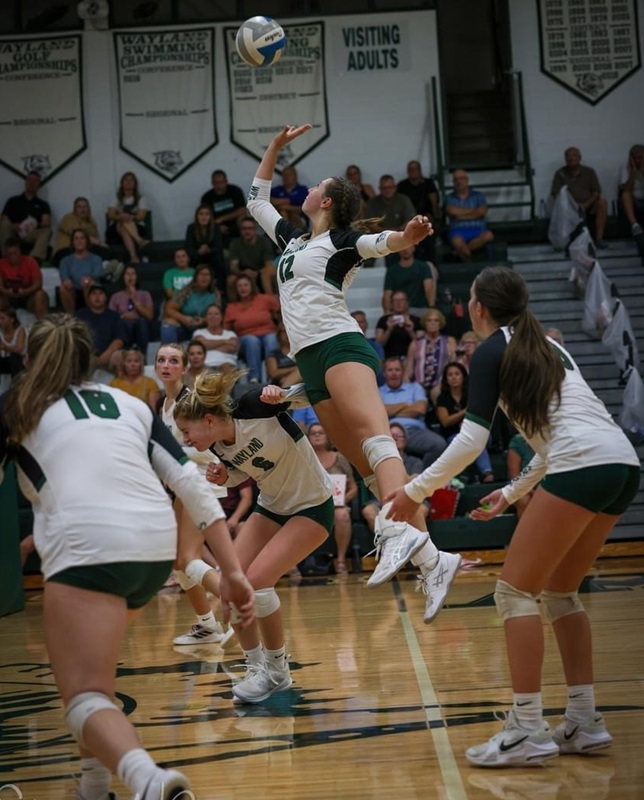 "Sports has always been a big part of our lives," Kara said. "We've never pushed our kids, but we've told them if you're going to be successful, you have to put in the time. My parents wanted us to do what we could (in sports). It was always in our prayers that our kids would truly love all sports. We're a competitive family, and we've always been drawn to sports."
"Sports has always been a big part of our lives," Kara said. "We've never pushed our kids, but we've told them if you're going to be successful, you have to put in the time. My parents wanted us to do what we could (in sports). It was always in our prayers that our kids would truly love all sports. We're a competitive family, and we've always been drawn to sports."
The Laker family navigates a busy sports schedule. Liberty Laker plays volleyball at Grace Christian University, eighth grader Charity plays the same three sports as her mother and sister, and third grader Christian plays football, baseball and basketball.
"We divide and conquer," Kara said of her and her husband following the robust schedules of four children.
Harmony's first memories of sports involve supplying water to her father's basketball players. From there, she progressed to copying the three sports in which her mother excelled.
Kara won Wayland's coveted Multer Award as the school's top multi-sport athlete. Harmony hasn't won the award yet, but seems a shoo-in before she graduates in 2025.
Kara said it's tougher for athletes now to play three sports as AAU and travel sports often collide with high school athletics. But in terms of playing three, she said that decision has always been left to the kids.
"It's harder these days, but we were three-sport athletes who wanted to be good in all three," said Kara, who admits she's had discussions with Harmony about narrowing her participation list.
"It's actually a discussion we're having at this moment," she said. "A lot of it comes down to coaches and having them all work together so Harmony can play."
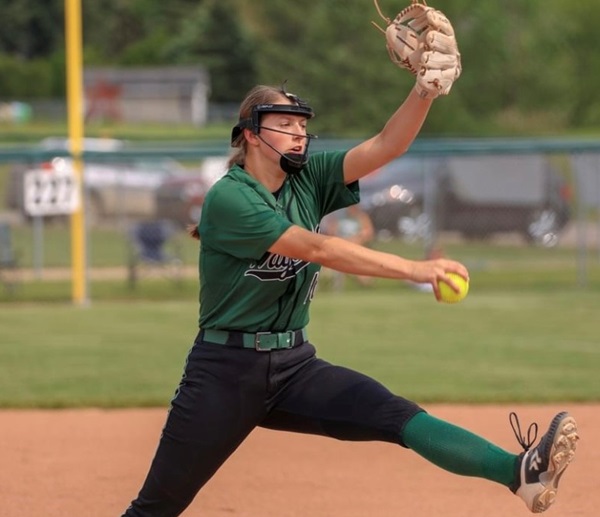 In order of preference, Harmony lists her favorite sports as basketball, volleyball and softball. But when it comes to cutting out a sport, Harmony hedges. If she plays all three as a senior – and that's currently the plan – she'll leave Wayland with 12 varsity letters, a rarity in today's high school sports world.
In order of preference, Harmony lists her favorite sports as basketball, volleyball and softball. But when it comes to cutting out a sport, Harmony hedges. If she plays all three as a senior – and that's currently the plan – she'll leave Wayland with 12 varsity letters, a rarity in today's high school sports world.
Harmony said the advice offered by her parents is the same that trickled down from their parents (her grandparents). Play as many sports as you choose, but also be well-rounded off the courts and fields.
Harmony is a member of the National Honor Society, leads the Wayland chapter of the Fellowship of Christian Athletes, is a member of the student council and has gone on numerous mission trips through her church.
But when it comes to athletics, Harmony is quick to revert to what she was taught early.
"I just want to work at my craft. You're only as good as the time you put in," she said. "My mom and dad have always said it's the heart that makes sports great. There are so many moments which are trials in sports and games, but ultimately that is what's going to make you better.
"Playing with pressure is a privilege. If a game is close and you have to execute, that's a privilege. God has put you out there for a reason, and you take the moments as they come."
PHOTOS (Top) Wayland’s Harmony Laker lines up for a free throw while playing her favorite sport, basketball. (2) Harmony, right, is successfully following in the multi-sport footsteps of her mother, Kara Laker. (3) Harmony Laker (12) soars to get a hand on a ball during volleyball season. (4) Laker makes her move toward the plate as a pitcher during the spring. (Action photos by Shannon N Jessica Photography.) mother/daughter photo courtesy of the Laker family.)

